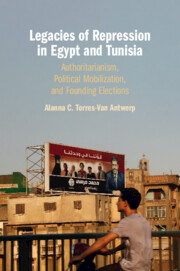 Legacies of Repression in Egypt and Tunisia
Legacies of Repression in Egypt and Tunisia Published online by Cambridge University Press: 10 March 2022
Authoritarian regimes vary with respect to regime–opposition relations, along a continuum of more open to more closed, focusing on the degree of competition the regime permits during elections. The particular political opportunity structure facing any individual opposition group varies according to the strategies that the regime uses in dealing with that particular group: inclusion, co-optation, or exclusion. The microfoundations of both party formation and political mobilization do not operate in isolation or in the same way as they do in established democracies, but in fact interact with the effects of the political opportunity structure that existed during the prior authoritarian era. An examination of the common competing explanations for party formation and political mobilization show that, while each explanation arguably does play a role in shaping these outcomes, they are limited in their comparative utility and frequently fail to explain the actual variation observed in these cases. Instead, mechanisms link the structure of state–opposition relations and the political opportunity structure facing different groups to their relative decisions around party formation as well as to the tactics and effectiveness of political mobilization in founding elections. Finally, the common causes of opposition group dissolution interact with the opportunity structure of the authoritarian era.
To save this book to your Kindle, first ensure [email protected] is added to your Approved Personal Document E-mail List under your Personal Document Settings on the Manage Your Content and Devices page of your Amazon account. Then enter the ‘name’ part of your Kindle email address below. Find out more about saving to your Kindle.
Note you can select to save to either the @free.kindle.com or @kindle.com variations. ‘@free.kindle.com’ emails are free but can only be saved to your device when it is connected to wi-fi. ‘@kindle.com’ emails can be delivered even when you are not connected to wi-fi, but note that service fees apply.
Find out more about the Kindle Personal Document Service.
To save content items to your account, please confirm that you agree to abide by our usage policies. If this is the first time you use this feature, you will be asked to authorise Cambridge Core to connect with your account. Find out more about saving content to Dropbox.
To save content items to your account, please confirm that you agree to abide by our usage policies. If this is the first time you use this feature, you will be asked to authorise Cambridge Core to connect with your account. Find out more about saving content to Google Drive.